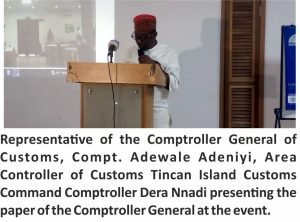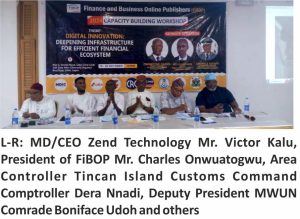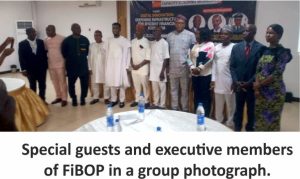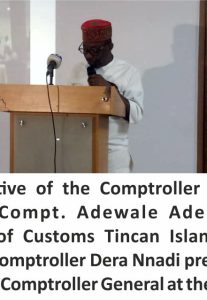RAYMOND TEDUNJAYE, Lagos.
 Experts in the finance and business sector converged in Lagos at the weekend for capacity building workshop to explore various ways of using digital innovation in deeping infrastructure for greater efficiency.
Experts in the finance and business sector converged in Lagos at the weekend for capacity building workshop to explore various ways of using digital innovation in deeping infrastructure for greater efficiency.
The event organised by the Finance and Business Online Publishers (FiBOP), themed, “Digital Innovation: Deepening Infrastructure For Efficient Financial Ecosystem”, held at Orchard Hotel Lekki, to upskill and enlightened media practitioners on the financial sub sector of the nation’s economy.
In his address of welcome, President of FIBOP Mr. Charles Onwuatogwu emphasised the importance of digital innovation to propel the country’s financial landscape.
He stated that the workshop was designed to equip participants with the skillet and knowledge required to thrive in the rapidly evolving ecosystem.
Highlighting its objective, the FiBOP President said it intended to enhance reporting capacity, foster collaboration and promote innovative information dissemination.
 He therefore called for greater collaboration between the Ministry of Communications and Digital Technology, banks and other relevant government agencies towards ensuring improved digital infrastructure as a means of lowering cost and improving transactions efficiency in the banking sector.
He therefore called for greater collaboration between the Ministry of Communications and Digital Technology, banks and other relevant government agencies towards ensuring improved digital infrastructure as a means of lowering cost and improving transactions efficiency in the banking sector.
The Comptroller- General of Nigeria Customs Service Adewale Adeniyi in a keynote address titled, “The Strategic Importance Of Digital Infrastructure In Import Duty Collection And Accountability”, said the NCS has leveraged on digital technology in the collection of revenue, underscoring the progress it has recorded using the technology.
Represented by the Area Customs Controller Tincan Island Command, Comptroller Dera Nnadi, the Comptroller-General disclosed that the NCS has raked in the sum of N4.289 trillion out of the N5.3 trillion as target for the 2024 fiscal year, even with about three months left in the year.
Comparing the amount so far collected in the current year with that of year 2023, the Comptroller General recalled that the Service collected a total sum of N3.21 trillion.
He stated that “What this means is that we have already surpassed our 2023 collection by over N1 trillion even though the year has not yet ended. This will enable you to understand the enormity of the progress that we have made leveraging on digital technology”, he said.
“Let me also try to relate this to our 2022 revenue. The Service was able to collect N2.6 Trillion in 2022. So, you can see that we are making steady progress and this is possible because we are deploying digitalization, ICT and innovation in our business process.
“This year’s improvement on import duty collection shows a marked improvement by measures put in place by the Central Bank of Nigeria and the commercial banks in the adoption of digital infrastructure for the customs processes.
“We have also realized that when we integrate our stakeholders into what we are doing, we achieve more successes. One of the key components of the e-Customs modernization project is the integration of various stakeholders into one digital platform.
 Speaking on the importance of digital infrastructure in import duty collection, the Customs boss said, “This is important because import duty collection and accountability cannot be overemphasized. They include enhanced efficiency, speed, improved transparency, increased revenue and most importantly, integration of all the stakeholders.
Speaking on the importance of digital infrastructure in import duty collection, the Customs boss said, “This is important because import duty collection and accountability cannot be overemphasized. They include enhanced efficiency, speed, improved transparency, increased revenue and most importantly, integration of all the stakeholders.
“Digital Infrastructure automates key processes in import duty collection, minimizing errors and reducing delays. Systems like NICIS II streamlines import/export documentation, ensuring that duties are assessed in real time. The result is faster clearance process, free flow of goods through our ports and efficiency and most importantly, encouraging competitiveness within Nigeria and some neighbours.”
Also speaking at the event, the Chairman/CEO of Zend Technology Mr. Victor Kalu lamented the resistance of the informal sector to pay tax.
Kalu, who stressed the need for Nigerians in the informal sector to pay taxes for infrastructural development, noted that the informal sector controls more funds outside the banking system.
“Available data shows that over three trillion Naira exist in the informal sector and this money is out of the Banking system, tell me how could Government cope when it doesn’t have available funds to finance projects the masses need to better their lives.”.
He said lapses exist in the system because people that pay tax hardly see what the authorities are doing with it. He, however, said the sole duty of citizens to Government is to pay their tax and leave government with development of roads, health care, Schools etc.
Kalu , insisted that only 20% of Nigerians pay tax regularly which he said is grossly inadequate for a country that desire
He said: “Market women don’t understand why they should pay taxes. But she forgot that the road that runs through her shop, the security in her neighbourhood, health center happened because of tax payment. More awareness is needed in Nigeria to hammer home the need for payment of taxes.”
Also speaking on behalf of the President General of Maritime Workers Union of Nigeria (MWUN), Comrade Adewale Adeyanju, the Deputy President General, Comrade Boniface Udoh reaffirmed the Union’s commitment to partner the media, adding that journalists have contributed immensely to nation building.
High point of the event was the presentation of award of excellence to deserving key players in the industry.


